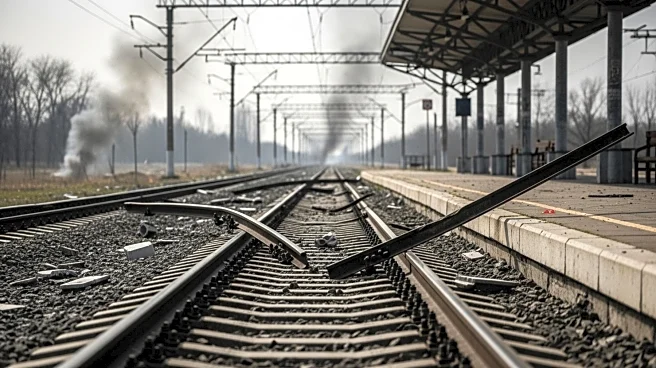What's Happening?
A Russian drone strike targeted a Ukrainian railway station in Shostka, a city northeast of Kyiv, injuring at least 30 people. The attack involved two passenger trains, one local and another bound for Kyiv. Ukrainian President Volodymyr Zelenskyy confirmed the incident, highlighting the ongoing air raid alert at the station. Emergency services are actively assisting the injured, with medical teams transporting them to hospitals. The strike is part of a broader Russian campaign targeting Ukraine's rail and power infrastructure, which has intensified as winter approaches. This attack follows a significant assault on Ukraine's natural gas facilities, marking a continued effort by Moscow to disrupt essential services in Ukraine.
Why It's Important?
The escalation of attacks on Ukraine's infrastructure by Russia has significant implications for the ongoing conflict. By targeting the railway network and power grid, Russia aims to disrupt military logistics and civilian life, potentially weakening Ukraine's defense capabilities and morale. The strikes on energy facilities threaten to leave thousands without power as winter nears, exacerbating humanitarian challenges. These actions could further strain international relations and prompt additional support for Ukraine from Western allies. The attacks also highlight the strategic importance of infrastructure in modern warfare, as controlling or disabling these assets can have far-reaching consequences.
What's Next?
Ukraine is likely to seek increased international support to bolster its defense capabilities and infrastructure resilience. The ongoing attacks may prompt further sanctions against Russia or increased military aid to Ukraine from Western nations. Additionally, Ukraine may enhance its air defense systems to better protect critical infrastructure. The international community will closely monitor the situation, as continued aggression could lead to broader geopolitical tensions. Humanitarian organizations may also increase efforts to provide aid to affected civilians, particularly as winter approaches and the need for reliable energy sources becomes more critical.
Beyond the Headlines
The targeting of civilian infrastructure raises ethical concerns about the conduct of warfare and the protection of non-combatants. The attacks could lead to long-term shifts in how nations approach the defense of critical infrastructure, potentially increasing investments in cybersecurity and physical defenses. The situation also underscores the vulnerability of interconnected systems in conflict zones, prompting discussions on international norms and regulations to protect civilian infrastructure during conflicts.









